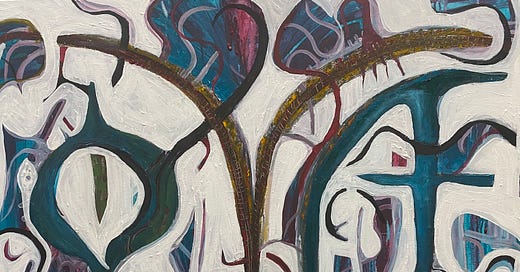Good, Evil, God’s Indescribable Oneness — & Other Ideas Just Within Reach
(Wrestling with belief, doubt, and the beauty of not knowing: a brief essay)
“Garden 11.B” painting by the author (acrylic on canvas)
I’m aware that there are those who might recoil at the word “God.” I was raised in a milieu where talk of God would have been more than strange. There was a grudging tolerance for all the things I had been doing as a teenager (I’ll refrain from naming them, except to say I was an ardent “adventurer”). But one thing I’m quite sure of is this: had I come home and started speaking about God in a serious way, my mother would have become very concerned — even more so than for my failing in school, more than for my… well, my other adventures. So concerned, in fact, that it seems likely she would have sought professional help for me.
I mention this only because I recognize how fraught — and how hopelessly unhelpful — the term “God” can be when trying to depict what I’ve come to think of as utterly ineffable and ultimately inexplicable.
For many, the word has become politicized, certainly anachronistic, likely boring, and in some instances, dangerous. It is also, as you well know, an English word — and with it come anthropomorphic associations, all justifiably rejectable.
I say all this because I will soon be using the word God, and I want you to know that I’m sensitive to your possible discomfort with it.
That said...
Someone once asked me how I could have faith in God when we live in a world as frightening and uncertain as ours is—a world where evil shows its face every day.
It’s both a good question and an impossible one to answer.
By way of providing an admittedly incomplete answer, I cited a short but crucial Hebrew phrase that observant Jews say when the Torah is removed from the ark during festivals and Sabbath services. In transliterated form, the phrase is written as Ain od milvado, which literally means “There is no aloneness like His.”
Its simplest interpretation is that there is only one God—as opposed to two gods or twenty gods. But it also has a deeper meaning: there is no conceivable—or inconceivable—thing, entity, or truth other than God. God’s existence (for lack of a better term) is a oneness that is comprehensive, entirely unique, entirely inexplicable, and empirically unprovable. God’s unity is so complete that it precludes the existence of all else. In a poetical sense, the phrase also implies that God alone is truly alone. (The more common translation of Ain od milvado would be: “There is nothing besides Him.”)
Maimonides, the twelfth-century philosopher, touched on this ineffable unity when he wrote that God is simultaneously the knower, the knowledge, and the known. In human experience, these things are always distinct—you are you, your thoughts are your thoughts, and the object you think about is something else entirely. But with God, there is no separation at all. God’s unity is absolute, indivisible, and beyond any analogy to human experience.
Here’s one more way of looking at it: at this very moment, God, in some sense, is responsible for my fingers tapping out these sentences on the keyboard of my computer, for each of the raindrops falling on the rooftops outside my window, and for every feather of every pigeon seeking shelter beneath the ledge of my hotel room window.
According to the logic of Ain od milvado, there can be no separate force of evil in the world. So, it follows that there could be no such thing as the devil—or at least there couldn’t be a force working independently of God. The dilemma is stark: assuming one believes that there is nothing other than God, logic dictates that there can be no force or power besides God. But how can an all-perfect God permit evil? How to explain the Holocaust or the death of a single child?
While an in-depth discussion of this concept is far beyond the scope of this brief essay, I’ll introduce the classical idea, which describes evil, or generally things we think of as bad, as the basis for free will. In other words, according to this idea, to bestow good—and for humankind to choose good, which is at the root of God’s “desire” to create the world in the first place—there had to be a modicum of evil, something that stands in seeming contradistinction to God.
Following this line of thinking, God creates and continuously sustains that which is in apparent opposition to God, to allow humankind freedom of choice. I use the phrase “apparent opposition” because even that modicum of evil is working at God’s behest, as it were. More simply put: if not for darkness, how would we identify light?
Tragically, we have, through our choices, enlarged that infinitesimal portion of evil far beyond its intended purpose. Therein lies the inherent challenge of mankind’s free will. The idea is crystallized in the famous biblical dictum: “I set before you life and death; choose life” (Deuteronomy 30:15). It’s humanity’s wrong choices (although they are choices “allowed” by God) that are responsible for the preponderance of evil in the world.
Yes, God would seem to have no restrictions. God could conceivably banish all evil. So why doesn’t He? The sages teach that removing evil would also remove humankind’s free will. I can grasp that on a theoretical level — but I distrust anyone who offers that answer too quickly, too neatly —especially in the presence of real suffering.
I had a dear friend, a brilliant older man, an avowed atheist, who passed away recently. Not often, but occasionally he and I would discuss ideas of faith and belief. I didn’t try to “argue” the case for the existence of God—those discussions are pointless. But I did once ask him if he believed that there were things that lay so far outside the ken of the human mind that they could never be conceived of, much less understood. Ultra-rationalist that he was, he was unable even to consider such a thing.
It was his opinion that with enough time and effort, theoretically at least, everything is knowable. My belief is that the human mind is inherently limited, and the number of things we are capable of truly understanding are utterly overshadowed by the things we will never comprehend.
To me, the question of faith in God comes down to more practical matters: How do we cope with the not-knowing that surrounds us at every moment? Where do we file our uncertainty about everything we experience? How can we accustom ourselves to the nearly supernatural phenomenon of our own consciousness? Or do we just ignore the fact that our existence and the existence of the entire universe and beyond is a miracle?
Given all that’s transpired over the past few years, I’ve been attempting to make peace with the unknowable. In doing so, I’ve found a sort of elevating humility, a state in which I feel myself a tiny part of the world, rather than the center of it—where everything doesn’t revolve around what I need, what I want, what I feel, and what I believe.
That doesn’t make me special or insignificant. It’s something quite different, something impossible to explain. I only know that the more willingly I approach the unfathomable, the nearer I come to my own ever-evolving connection to God.
Faith is difficult. It isn’t so much about belief as it is about adjusting to being human.






Your friend said that he could not comprehend of something not being knowable, eventually. but even in something so mundane as physics the Heisenberg uncertainty principle states that one can not know either the velocity or the place of a sub atomic particle. That's not a proof of anything just that there are things unknowable. Physical things. We don't know so much
I really love reading you or listening to you, Peter even though I don’t agree with you, but that doesn’t matter does it warmly Linda